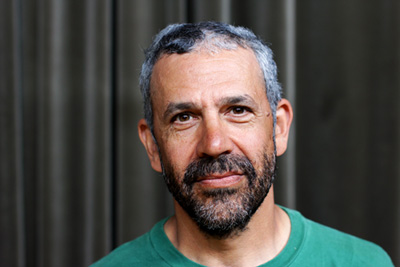Q+A with Daniel Brooks

Award-winning director Daniel Brooks [A Doll’s House, 2016] is spending six weeks teaching the artists of the Soulpepper Academy. He sat down in the Young Centre atrium with Academy playwright Rosamund Small to answer a few questions about art, process and learning.
DANIEL: I always wanted to be one of those people who were really witty when asked questions. I always wanted to have the perfect quip, and sound really smart. But I’m just not.
ROSAMUND: I’ll edit it so you sound like Oscar Wilde.
DANIEL: Thank you.
ROSAMUND: So, to start, what have you been doing with the Academy?
DANIEL: I’m working on Chekhov’s Three Sisters with [the Academy]. I’m analysing the play, and asking them to choose scene partners, cook up a scene, then I send them away and they rehearse more and bring it back again for us to work on together. We’ll be doing some new scenes today and I’m very curious to see if they start them way ahead in quality of the original scenes they brought me, on the second day of our classes together.
R: If you could pick one idea that you hope the Academy grasp from your teaching, what would it be?
D: I hope they will shed the idea that there is a final product that is to be repeated night after night in performance. You may get to the point, after opening night, where the director has left and there is set blocking, even maybe set gesture. But you [the actor] need be open to the moment, and to your breath, and discover the scene every night. The ‘liveness’ of performance.
R: You’ve already worked with my fellow Academy Playwright Sina Gilani, who assistant-directed your production of A Doll’s House here at Soulpepper. Can you tell me about what brings you and Sina together artistically?
D: I love working with Sina. He has such an authentic and untainted experience of art. Sophisticated, [and] schooled, but also untainted by any ideologies. He is so unbelievably open hearted in the way that he receives work…theatre….and people.
R: What do you love most about Chekhov?
D: The way Chekhov is able to write with wisdom, about human relations, language, the individual and society, the way he battles with the idea of the time, and the way he orchestrates a play, it’s like a symphony. Are you learning from him?
R: From Chekhov? Of course!
D: He’s really amazing.
R: What Chekhov would you choose to direct?
D: This really is an interesting time right now to think about what kind of play to do. There are some things happening in the world that are very, very, serious, obviously. So I would have to think very, very carefully about whether it’s the time for Three Sisters. But if I were to approach a theatre company about a Chekhov, I think I would propose Three Sisters.
R: Can you share a pivotal educational experience you had in your early career?
D: Working with Philippe Gaulier was very important to me. I attended his two-month workshop in Paris. I studied clown and jeu, and learned a lot. And at the same time in Paris I saw Pina Bausch for the first time. Wow.
R: Who is a Soulpepper artist who inspires you?
D: Diego Matamoros. His commitment, dedication, focus, wisdom around his craft and work, has inspired me. And of course, his talent. I’ve learned a lot about acting with him, and from him.
R: Anything else you would like to say?
D: We’re in the throws of a very serious historical movement [in the world]. And I think – for the patrons of the arts specifically – it’s an opportunity to insist that the theatre turn away from box office accounts, and ask some really serious questions about how theatre can engage with the world.
By Rosamund Small